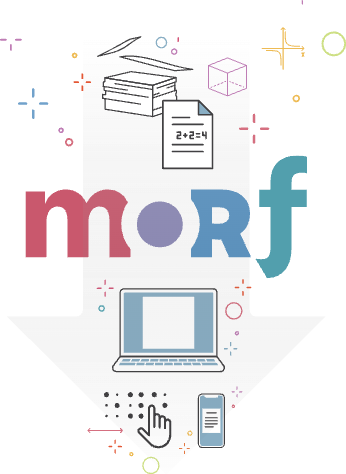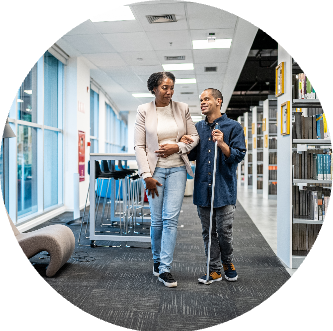
Automated access to math documents for blind and visually impaired students

With MORF, you can provide blind and visually impaired individuals with instant access to mathematical documents. Simply upload a document to the app and download an accessible version of it in the format you desire.
Morf converts mathematical equations, figures, and texts into common embossed tactile and screen reader formats. Learn more about how Morf can help expand math access for your students.
Morf can convert documents to:
.docX, .pdf, .svg, .Brf, More formats coming soon!




UNiversal Accessibility Research (UNAR) Labs is Expanding Information Access For All
Our Mission is to Enable Digital Information Access to Everyone, Irrespective of Their Sensory Abilities
We embarked on this mission in 2010, when founders Hari Palani and Nick Giudice started talking about how touch and audio capabilities of commercial smartphones and tablets could be leveraged to provide non-visual access to all matter of visual graphical information.

UNAR is Used and Supported By
Morf provides quick and easy access to math documents
Create a free account to upload your first math document
Create an accountMorf provides quick and easy access to math documents
Morf converts mathematical equations, figures, and texts into common embossed tactile and screen reader formats. Learn more about how Morf can help expand math access for your students.
With MORF, you can provide blind and visually impaired individuals with instant access to mathematical documents. Simply upload a document to the app and download an accessible version of it in the format you desire.
Create a free account to upload your first math document
Morf can convert documents to:
.docX, .pdf, .svg, .Brf, More formats coming soon!




UNiversal Accessibility Research (UNAR) Labs is Expanding Information Access For All
Our Mission is to Enable Digital Information Access to Everyone, Irrespective of Their Sensory Abilities

UNAR is Used and Supported By
Morf provides quick and easy access to math documents
Morf converts mathematical equations, figures, and texts into common embossed tactile and screen reader formats.
With MORF, you can provide blind and visually impaired individuals with instant access to mathematical documents.
Simply upload a document to the app and download an accessible version of it in the format you desire.
Create a free account to upload your first math document
Morf can convert documents to:




and
more formats coming soon!
UNiversal Accessibility Research (UNAR) Labs is Expanding Information Access For All

Our Mission is to Enable Digital Information Access to Everyone, Irrespective of Their Sensory Abilities
UNAR is Used and Supported By